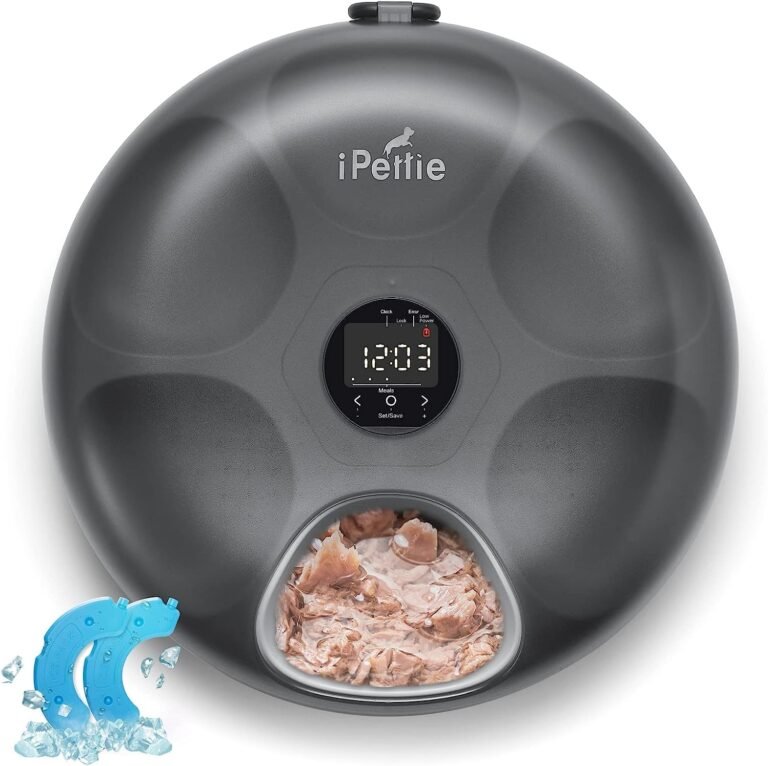Integrating Physical Health with Mental Health in Pets
Total wellness for pets goes beyond just physical health. It involves integrating their physical health with their mental wellbeing. By considering factors such as exercise, nutrition, and mental stimulation, we can ensure that our pets remain fit, healthy, and happy. In this article, we will explore the connection between physical health and mental wellbeing in pets, recognize signs of stress and anxiety, create a holistic wellness routine, and discuss the benefits of regular veterinary check-ups. Here are the key takeaways:
Key Takeaways
- Exercise plays a significant role in promoting mental health in pets.
- A balanced diet is essential for both physical and mental wellbeing in pets.
- Mental stimulation activities prevent boredom and promote cognitive function in pets.
- Recognizing common behavioral indicators can help identify signs of stress in pets.
- Stress in pets can lead to physical health issues, highlighting the importance of addressing their mental wellbeing.
Understanding the Connection between Physical Health and Mental Wellbeing in Pets

The Impact of Exercise on Mental Health in Pets
Regular exercise plays a crucial role in promoting mental health in pets. Just like humans, pets can experience stress and anxiety, and exercise is an effective way to alleviate these feelings. Physical activity stimulates the release of endorphins, which are natural mood boosters that help reduce anxiety and improve overall emotional well-being. Additionally, exercise provides an outlet for pets to release pent-up energy and frustration, leading to a calmer and more balanced state of mind. By incorporating regular exercise into your pet’s routine, you can help them maintain a healthy and happy mental state.
The Role of Nutrition in Promoting Mental Wellbeing in Pets
As in humans, nutrition is the foundation of overall health. What you feed your pet, the quality and amount will have both short-term and long-term effects. If you want those effects to be positive, it is important to feed a diet that is balanced and nutritious. Taking into account your dog’s current physical, emotional, and mental state and striving to treat the entire pet rather than concentrating on individual symptoms is crucial. Considering diet, exercise, and mental health when assessing a dog’s overall health can help ensure that your dog remains fit and maintains a healthy weight. Moreover, a balanced diet can support physical and mental well-being, while mental stimulation can promote cognitive function and prevent boredom. Adopting a holistic approach to your dog’s well-being promotes their overall happiness and quality of life throughout the years they spend with you.
The Importance of Mental Stimulation for Overall Pet Wellness
When considering your pet’s overall wellness, it’s crucial to take into account their current physical, emotional, and mental state. Treating the entire pet rather than focusing on individual symptoms is key. A balanced diet plays a significant role in supporting physical and mental well-being. Additionally, mental stimulation is essential for promoting cognitive function and preventing boredom. By adopting a holistic approach to your pet’s well-being, you can ensure their overall happiness and quality of life. Incorporating mental stimulation activities into your pet’s daily routine is a great way to keep their minds sharp and engaged.
Recognizing Signs of Stress and Anxiety in Pets

Common Behavioral Indicators of Stress in Pets
If pets could talk, vet visits would be a whole different ballgame. Until then, vets wish you’d watch for the silent signals your pet sends when they’re not 100%. These could be clues to bigger issues. Some obvious signals of distress include difficulty breathing, limping, crying, or not eating. However, there are less obvious tells as well. If your pet exhibits any significant change in behavior, your vet’s trained eye can decipher these signs. When in doubt, don’t wait to give them a call.
Identifying Anxiety Triggers in Pets
Identifying anxiety triggers in pets is crucial for their overall wellbeing. Cats, for example, are known to be sensitive creatures and can easily become stressed in certain situations. Some common anxiety triggers for cats include loud noises, changes in routine, unfamiliar environments, and social interactions with other animals. It’s important to pay attention to your cat’s behavior and look for signs of distress such as excessive grooming, hiding, aggression, or excessive vocalization. By identifying and addressing these triggers, you can help reduce your cat’s anxiety and promote a calmer and happier environment for them.
The Link between Stress and Physical Health Issues in Pets
Stress in pets can have a significant impact on their physical health. Hydration is one key aspect that can be affected by stress. When pets are stressed, they may experience changes in their water intake, leading to dehydration. It’s important to ensure that your pet has access to fresh water at all times and encourage them to drink regularly. Dehydration can lead to various health issues, including urinary tract problems and organ dysfunction. By monitoring your pet’s hydration levels and providing adequate water, you can help maintain their overall wellbeing.
Creating a Holistic Wellness Routine for Your Pet

Designing an Exercise Plan for Optimal Physical and Mental Health
When creating an exercise plan for your pet’s optimal physical and mental health, it’s important to consider their specific needs and abilities. Regular physical activity is essential for keeping your pet healthy and happy. It helps them maintain a healthy weight, improves their cardiovascular health, and reduces the risk of chronic diseases. Additionally, exercise plays a crucial role in promoting mental wellbeing in pets. It helps them release excess energy, reduce anxiety and stress, and improve their overall mood.
To design an exercise plan that suits your pet, consider their age, breed, and any existing health conditions. Consult with your veterinarian to determine the appropriate intensity and duration of exercise. Variety is key when it comes to keeping your pet engaged and motivated. Incorporate different activities such as walking, running, playing fetch, or swimming. Remember to start slow and gradually increase the intensity to avoid any injuries.
In addition to physical exercise, mental stimulation is equally important for your pet’s overall wellness. Engage their mind with puzzle toys, interactive games, or training sessions. These activities not only provide mental stimulation but also strengthen the bond between you and your pet. Make it a daily routine to spend quality time engaging in these activities with your pet. Not only will it keep them mentally stimulated, but it will also provide an opportunity for you to observe their behavior and detect any signs of stress or anxiety.
Remember, designing an exercise plan for your pet is not only about physical health but also about their mental wellbeing. By providing them with regular exercise and mental stimulation, you are ensuring that they are a refreshed and clean pup, both physically and mentally.
Choosing the Right Diet for Your Pet’s Wellbeing
As in humans, nutrition is the foundation of overall health. What you feed your pet, the quality and amount will have both short-term and long-term effects. If you want those effects to be positive, it is important to feed a diet that is balanced and nutritious. Ultimately, if you need help decoding your pet’s ideal nutritional guidelines, it’s best to ask your vet. You both know your dog or cat better than any internet expert and can make an informed decision together. Your vet is there to help you navigate the course. There’s no "ideal diet" across the board. Different pets have different needs. Is this food fad fabulous or a flop? Is raw food better for pets, or grain-free? Well, your vet has some food for thought. The "ideal diet" is a myth; each pet is unique, and so are their nutritional needs. Take a seat at the vet’s table to dish out the best meal plan for your pet. It’s a conversation worth having for their health’s sake.
Incorporating Mental Stimulation Activities into Your Pet’s Daily Routine
Incorporating mental stimulation activities into your pet’s daily routine is essential for their overall wellbeing. These activities help keep their minds sharp and engaged, preventing boredom and promoting cognitive function. Here are some ways you can incorporate mental stimulation into your pet’s daily routine:
- Puzzle toys: Use interactive puzzle toys that require your pet to problem solve and think. This can include treat-dispensing toys or toys that require them to manipulate objects to find hidden treats.
- Training sessions: Regular training sessions not only provide mental stimulation but also strengthen the bond between you and your pet. Teach them new tricks or practice commands to keep their minds active.
- Hide and seek: Hide treats or toys around the house for your pet to find. This engages their sense of smell and encourages them to use their problem-solving skills.
Remember, mental stimulation activities should be tailored to your pet’s abilities and preferences. Be patient and provide positive reinforcement as they engage in these activities. By incorporating mental stimulation into your pet’s daily routine, you are promoting their overall mental wellbeing and preventing boredom.
The Benefits of Regular Veterinary Check-ups for Pet Wellness

Preventive Care: Detecting Health Issues Early
Regular check-ups, whether annual or biannual, are an key aspect of a preventive health care plan for your pet. During these visits, your veterinarian will discuss dental health, nutrition, weight, behavioral concerns, assess for pain, and perform a complete physical exam. They will then come up with a wellness plan specific for your pet, that may include diagnostics such as blood and parasite screening. The main reason vets recommend regular check-ups is because they want to help prevent and detect problems early when there is still the possibility for a better outcome for your pet. In that respect, regular check-ups may help save you money in the long run by catching any issues before they snowball into bigger problems. Not all online resources are bad, but your vet knows best. The internet is a jungle of pet advice, and it’s tempting to turn to ‘Dr. Google’ for quick answers. Remember, not all that glitters is gold. While there are trustworthy sites that can provide excellent information about pet health, diet, behavior, it’s important to consult with your veterinarian for accurate and personalized advice.
Addressing Behavioral Concerns with Professional Guidance
When it comes to addressing behavioral concerns in your pet, seeking professional guidance is crucial. Pet Feeding is one aspect that can greatly impact your pet’s behavior and overall wellbeing. A professional can provide valuable insights and recommendations on the right feeding routine and diet for your pet. They can assess your pet’s specific needs, taking into consideration factors such as age, breed, and any existing health conditions. With their expertise, they can help you create a feeding plan that promotes a balanced diet and supports your pet’s mental and physical health.
In addition to diet, a professional can also assist in identifying any underlying behavioral issues that may be causing stress or anxiety in your pet. They can conduct a thorough assessment and observation to understand the triggers and patterns of your pet’s behavior. Based on their findings, they can develop a personalized behavior modification plan to address these concerns.
It’s important to remember that addressing behavioral concerns requires patience and consistency. Following the guidance of a professional can greatly improve your pet’s overall wellbeing and strengthen the bond between you and your furry companion.
The Role of Vaccinations in Maintaining Overall Pet Health
Vaccinations can be vital for your pet. There are also some alternatives. The vaccine debate isn’t just for humans. When it comes to pets, they can be lifesavers. But it’s not a one-size-fits-all. Your vet wishes you knew that they’re in your corner, aiming for your pet’s health and happiness with every tool in their kit, including vaccines and alternative measures in place of vaccines. It’s a partnership where you call the shots, with your vet as your guide. You should be having regular conversations with your vet regarding which vaccines should be administered to keep your pet healthy. They may even recommend checking titers that test your pet’s level of immunity against certain diseases. In that case, a vaccine may not be needed. In the end, clients are in charge of their pet’s health. Your vet is there to help you navigate the course.
Regular veterinary check-ups are essential for maintaining the overall wellness of your pets. These check-ups allow veterinarians to detect any potential health issues early on and provide appropriate treatment. By scheduling regular check-ups, you can ensure that your pets receive the necessary vaccinations, screenings, and preventive care. Additionally, veterinary check-ups also provide an opportunity for pet owners to discuss any concerns or questions they may have about their pet’s health. At Whisker Wellbeing, we understand the importance of regular veterinary check-ups and offer holistic and natural care options for your pets. Visit our website to learn more about our products, including CBD, hemp, and other natural options, that can enhance the physical and emotional quality of life for your pets.
Conclusion
In conclusion, integrating physical health with mental wellbeing is essential for the total wellness of our pets. By taking a holistic approach and considering their diet, exercise, and mental stimulation, we can ensure that our pets remain fit, maintain a healthy weight, and promote their cognitive function. Providing them with the necessary care and addressing both their physical and emotional needs is crucial for their overall happiness and quality of life. As pet owners, it is our responsibility to embrace holistic health care and prioritize the wellbeing of our furry companions. By doing so, we can create a world where our pets thrive and experience optimal health and happiness.
Frequently Asked Questions
Why is it important to consider the connection between physical health and mental wellbeing in pets?
Considering the connection between physical health and mental wellbeing in pets is important because it allows us to treat the entire pet rather than just focusing on individual symptoms. By taking into account their diet, exercise, and mental health, we can ensure that pets remain fit, maintain a healthy weight, and promote their overall happiness and quality of life.
How does exercise impact the mental health of pets?
Exercise has a positive impact on the mental health of pets. Regular physical activity helps reduce stress, anxiety, and boredom in pets. It promotes the release of endorphins, which are natural mood boosters, and improves cognitive function. Exercise also helps pets maintain a healthy weight and prevents physical health issues.
What role does nutrition play in promoting mental wellbeing in pets?
Nutrition plays a crucial role in promoting mental wellbeing in pets. A balanced diet that provides essential nutrients supports their overall physical and mental health. Certain nutrients, such as omega-3 fatty acids and antioxidants, have been linked to improved brain function and mental acuity in pets. Providing high-quality, nutritious food is essential for their mental wellbeing.
How can I recognize signs of stress and anxiety in my pet?
There are several common behavioral indicators of stress in pets, including excessive barking, aggression, destructive behavior, changes in appetite, and withdrawal. Pets may also exhibit physical symptoms like excessive shedding, digestive issues, and changes in sleep patterns. It’s important to observe your pet’s behavior and consult with a veterinarian if you suspect they are experiencing stress or anxiety.
What are some common anxiety triggers in pets?
Pets can experience anxiety due to various triggers, such as loud noises (thunderstorms, fireworks), separation from their owners, changes in routine or environment, and past traumatic experiences. It’s important to identify these triggers and provide a safe and comforting environment for your pet. Behavioral training and techniques like desensitization and counterconditioning can also help alleviate anxiety.
How does stress affect the physical health of pets?
Stress can have a significant impact on the physical health of pets. Chronic stress weakens the immune system, making pets more susceptible to infections and diseases. It can also lead to digestive issues, skin problems, and weight fluctuations. Additionally, stress can exacerbate existing health conditions and slow down the healing process. Managing stress is essential for maintaining optimal physical health in pets.







